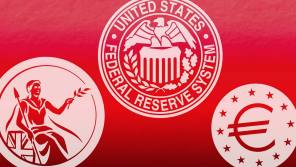

Each major escalation in the dispute has incited a panicked response from investment markets, while economic data across the US, China and the global economy has demonstrated signs of strain.
This is particularly concerning in a global economy already struggling to find growth.
Changes in trading arrangements can quickly lead to ripple effects throughout both domestic economies and the wider world.
Through shifts in pricing (resulting from changing supply and demand dynamics) the impact can extend to everyone in the economy.
Tea, opium and electronics: trade wars through history
In theory, trade is designed as an act of mutual benefit.
However, history is littered with examples of it being used as a weapon, often playing a part in national and global political history.
The infamous Boston Tea Party in 1773 was, on the surface, the destruction of a tea shipment in response to an unfair tariff scheme imposed by the ruling British.
But this act of defiance is also widely seen as one of the sparks that lit the flame of the American Revolution, ultimately leading to US independence from the UK.
Less than 100 years later, the Opium Wars between China’s Qing dynasty and the British Empire foreshadowed some of President Trump’s frustrations about Chinese trade imbalances today.
In the early decades of the 1800s, the UK had come to realise that Europe was buying far more from China than China was importing from Europe in return.
While 21st century America faces a slew of Chinese electronics and other manufactured goods, 19th century Europe was hungry for Chinese silk, tea and porcelain.
And if Trump’s decision to tax billions of dollars’ worth of Chinese exports seems dramatic, consider that for the British Empire in the 1800s, redressing the balance meant pouring opium into China, against the Qing dynasty’s express wishes.
The result of the Opium Wars was the takeover of key territories (including Hong Kong) by the UK, and China being forced to accept tariff-free trading.
The wars also permanently disrupted rural communities across South Asia (where opium was farmed), arguably even fuelling the growth of the colossal opiate industry in evidence today.
Trade wars have often been responsible for making bad economic situations worse.
During the Great Depression in the 1930s, US President Hoover signed the Smoot-Hawley Tariff Act, which raised import duties on foreign goods.
In another prequel to Trump’s own stance, one of Hoover’s primary goals was to protect US businesses.
However, retaliatory tariffs from abroad led to a drop in US exports, likely worsening and prolonging the Great Depression.
Can trade wars be justified?
In March 2018, President Trump announced that “trade wars are good, and easy to win.”
The evidence suggests that, in reality, they are neither.
And while trade restrictions are inevitable and can be justifiable, the arguments in favour of outright trade war are decidedly mixed.
- Gains from trade agreements are not usually shared equally by everyone, and as a result can be said to fuel inequality. Even so, trade is widely accepted as a positive for economic growth, and for raising average incomes.
- It could be argued that trade wars act as a proxy for physical confrontation, and therefore help to avoid open warfare. However, this has not always been the case (e.g. the Opium Wars included armed conflict).
- An argument could be made that, in reducing global trade, trade wars might lower the carbon emissions associated with mass manufacturing and transportation. However, trade wars often reflect diplomatic hostility – bad news for the international cooperation so sorely needed on sustainability initiatives.
- At least part of Trump’s initial dispute with China focused on protecting US intellectual property (IP), especially in the technology sector. However, Trump’s rhetoric quickly moved on to other topics and his IP protection goals took a relative backseat, not featuring in October 2019’s ‘Phase 1’ agreement. It is also worth noting that protectionism can unduly prolong the lifespan of inefficient or underperforming companies, as it belies any ‘survival of fittest’ principles.
Where does trade go from here?
As we enter 2020, a significant portion of global trade policy continues to hang on the whims of one man.
And as the US turns its trade spotlight onto Europe too, it demonstrates a willingness to fight trade battles on multiple fronts simultaneously.
Investors would do well to brace themselves for further protectionist policies and tariff disputes ahead.
Even so, the global trade journey could take many routes from here, and markets have demonstrated their propensity to respond positively to signs of cooperation and optimism.
With this in mind, we should still remain mindful of the positive outcomes (such as an increase in imports and exports, leading to better growth potential) that trade deals can create.
Scott Ingham is investment director of Heartwood Investment Management



